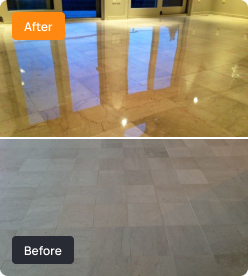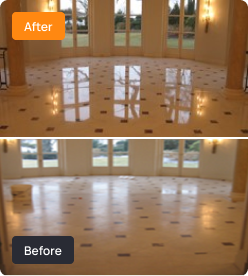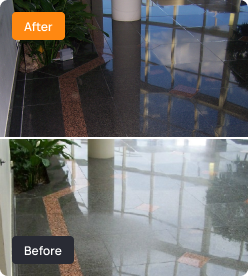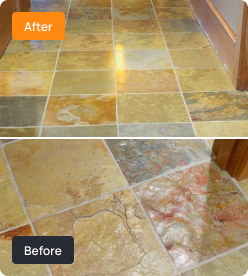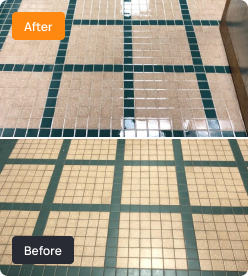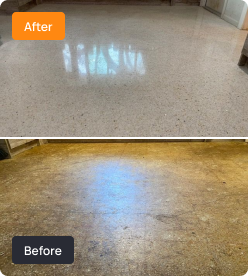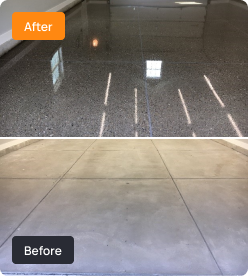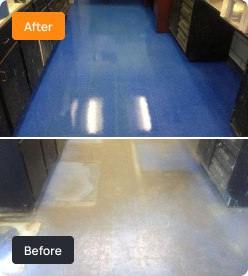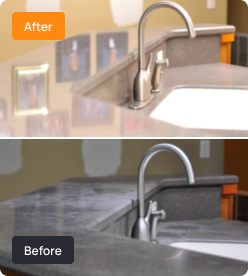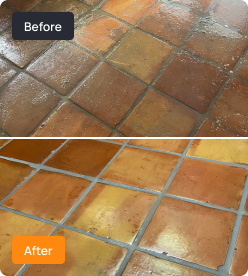Ensuring Pet-Friendly Floor Maintenance with MARBLELIFE
Maintaining a clean home can be challenging, especially when you have pets. As a pet owner, you love your furry friend more than anything, but their presence can take a toll on your floors. From muddy paw prints to shedding fur, it’s no secret that pets can cause significant wear and tear on your floors. […]
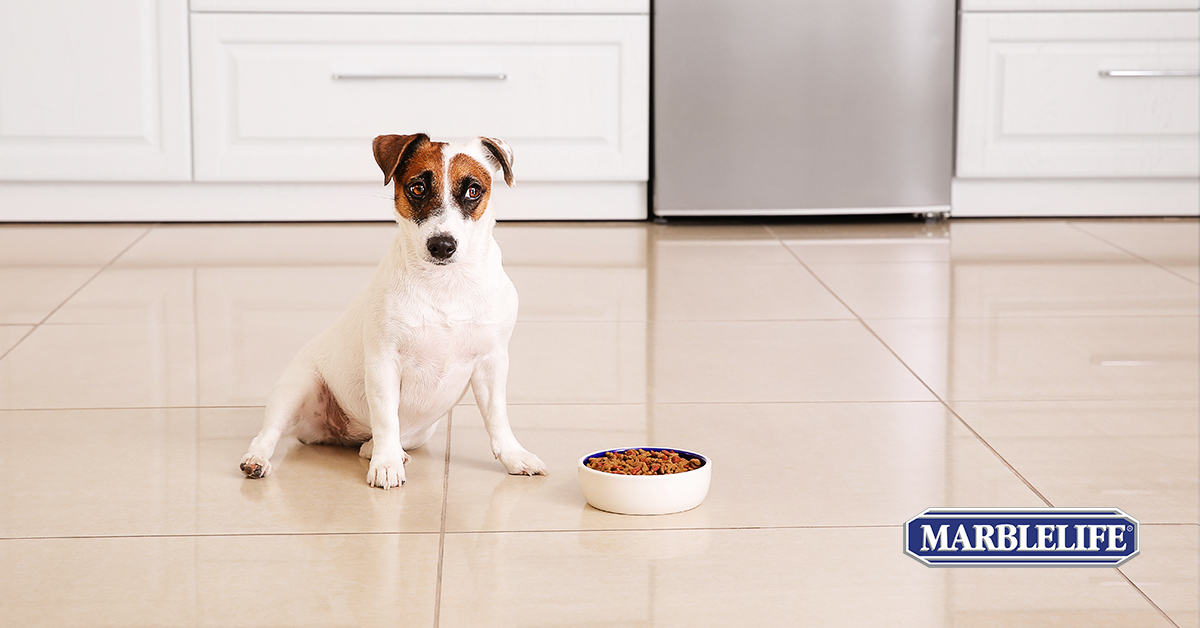

Maintaining a clean home can be challenging, especially when you have pets. As a pet owner, you love your furry friend more than anything, but their presence can take a toll on your floors. From muddy paw prints to shedding fur, it’s no secret that pets can cause significant wear and tear on your floors.
That’s why it’s crucial to prioritize floor care if you’re a pet owner. Not only does it improve the appearance of your home, but it also helps to ensure the longevity of your flooring. You can prevent your floors from costly repairs or replacements by taking proper care.
This blog post shares essential tips for maintaining and cleaning your floors as a pet owner. Whether your floors are hardwood, carpet, or tile, we have the perfect solution. Let’s explore the best floor care practices for pet owners!
Types of Floors
Hardwood Floors
Hardwood floors exude a classic charm and elegance, making them a sought-after choice for homeowners. However, when you have a pet, maintaining the pristine appearance of these floors can be challenging. Let’s explore the intricacies.
Common Issues Pet Owners Face with Hardwood Floors:
- Scratches and Dents from Pet Claws and Nails: Active pets, especially giant dog breeds, can inadvertently scratch the floor surface when they move around, play, or even get a sudden burst of energy known as the ‘zoomies.’
- Stains and Odors from Accidents and Spills: Accidents can happen, especially with younger pets or those still in training. Urine can seep into the wood grains if not cleaned promptly, causing lasting damage and unpleasant odors.
- Wear and Tear from High-Traffic Areas: Some parts of your home, like hallways or living areas, naturally witness more foot (and paw!) traffic. Over time, this can lead to visible wear patterns on your hardwood.
Tips for Maintaining Hardwood Floors with Pets
- Regular Nail Trimming: Keep your pet’s nails short and smooth. Shorter nails aren’t just good for your floors and your pet’s health and comfort. Sharp claws can split or crack, causing pain for your furry friend. Consider investing in a quality nail grinder, which can round off the nails and reduce the chances of scratches.
- Invest in Quality Area Rugs: A strategically placed area rug enhances the decor and protects your floor. Opt for rugs with a non-slip bottom to ensure your pet’s enthusiastic antics don’t send it flying.
- Prompt Cleanups are Essential: The longer a spill sits on hardwood, the deeper it can penetrate, leading to staining or warping. Always have cleaning supplies on hand and address any accidents immediately.
- Opt for Pet-Friendly Cleaning Products: Many cleaning agents contain chemicals that can strip the protective finish off hardwood floors. Moreover, some of these chemicals can be harmful if ingested or inhaled by pets. Always read labels and choose products that are safe for pets and hardwood finishes.
- Regular Cleaning Routine: Pet hair, dander, and dirt can act as abrasives, potentially scratching your floors over time. Regular sweeping or vacuuming can prevent buildup. If you use a vacuum, ensure it has a hardwood setting to avoid causing scratches.
- Protective Pads and Barriers: Consider placing protective pads beneath furniture and pet accessories. These pads prevent friction between the table or pet accessory and the floor. As an added tip, ensure it’s stable if you’re using a scratching post. An unstable position can topple, potentially damaging the floor.
- Professional Refinishing: Even with meticulous care, hardwood floors can show signs of wear over the years. Refinishing or sanding can revive your floor’s shine, making it look as good as new. Ensure you choose a finish that’s both pet-friendly and durable.
Carpeted Floors: Navigating the Challenges with Pets
With their soft texture and warmth, carpeted floors are a popular choice for many homeowners. They provide a comfortable surface for our feet (and paws) and can add an element of coziness to a room. However, carpet maintenance becomes more involved when pets are in the picture.
Common Issues Pet Owners Face with Carpeted Floors:
- Embedded Pet Hair and Dander: Unlike hardwood or tile, carpets can trap pet hair and dander deep within their fibers. Over time, this can lead to allergen buildup and a persistent pet odor.
- Stains and Odors from Accidents: Whether it’s an untrained puppy or an elderly cat, accidents can occur. When these happen on a carpet, they can lead to stubborn stains and persistent odors if not addressed promptly.
- High-Traffic Wear and Tear: Just like with hardwood, certain areas in the home, like corridors or spaces near entrances, can exhibit faster wear due to frequent use by humans and pets.
Comprehensive Tips for Maintaining Carpeted Floors with Pets
- Commit to Regular Vacuuming: It’s essential to vacuum often, ideally daily or every other day, especially if you have multiple pets or long-haired breeds. This measure prevents hair and dander buildup and keeps your carpet looking fresh.
- Choose the Right Vacuum: Not all vacuums are created equal. A vacuum equipped with a HEPA filter can be a game-changer for homes with pets. It captures even the tiniest allergens, promoting a healthier living environment.
- Strategic Use of Rugs and Runners: Incorporate area rugs or runners in high-traffic zones. They enhance the aesthetic appeal and can act as a protective barrier, absorbing the brunt of the wear and tear. And when they get dirty? Simply wash or replace!
- Immediate Attention to Spills and Accidents: Time is of the essence when dealing with pet accidents. A pet-specific carpet cleaner can effectively break down enzymes in pet waste, ensuring odors and potential stains are mitigated. Always do a patch test before using any new cleaning product.
- Consider Advanced Carpet Solutions: In the market for a new carpet? Opt for stain-resistant varieties designed with pets in mind. Alternatively, applying a carpet protector can offer a layer of defense against potential spills and stains.
- Regular Professional Cleanings: Even with rigorous at-home cleaning, scheduling professional carpet cleanings every 6-12 months can help maintain the carpet’s quality and longevity. Professionals have the tools and know-how to deep clean, ensuring allergens, dirt, and any residual pet odors are thoroughly addressed.
- Pet Training is Crucial: Training pets to use specific potty areas, litter boxes, or pee pads can significantly reduce the risk of accidents on the carpet. Regular training sessions, positive reinforcement, and patience are key.
Tile or Laminate Floors: A Pet Owner’s Guide to Maintenance
Tile and laminate floors offer a sleek look combined with durability. However, maintenance can become more challenging when pets are part of the household. Let’s examine the issues and solutions:
Common Challenges with Tile or Laminate Floors for Pet Owners
- Scratches and Dents: Tiles are typically resistant to scratches, but laminate can show wear under the routine impact of pet claws.
- Stains and Odors: Accidents and spills can leave lasting marks or smells if not cleaned promptly, even on tile or laminate.
- Grout Discoloration: Pet urine can lead to noticeable discoloration in grout lines, which are porous and tend to hold onto stains.
Proactive Tips for Maintaining Tile or Laminate Floors with Pets:
- Regular Cleaning: Consistent sweeping or vacuuming helps prevent pet hair accumulation and debris on the surface.
- Immediate Cleanup: Address pet accidents with a damp cloth to prevent staining, especially on tiles where quick action can keep urine from soaking into the grout.
- Specialized Cleaning Solutions: Using a product like MARBLELIFE® Tile & Grout Cleaner can be highly beneficial. This cleaner acts like a liquid sponge, drawing out oils, dirt, and residues deep within grout pores and textured tile crevices. Not only does it clean surfaces effectively, but it also extracts oils that can age within the grout pores, leading to stinky odors and bacterial growth. Moreover, its concentrate form offers impressive coverage – a 32 oz concentrate can make up to 64 quarts.
- Pet-friendly Cleaning Agents: Ensure that the cleaning products, including MARBLELIFE® or others, are safe for pets. Harsh chemicals can damage laminate finishes and may pose health risks to pets.
- Grout Line Protection: To ensure optimal protection for your grout lines, think about using a quality sealant like MARBLELIFE Grout Sealer for Tile Surfaces. This bottle packs a powerful punch, offering a top-tier combination of the most desired qualities of leading sealers without their common drawbacks. Its dual hydrophobic and oleophobic fluoropolymer-impregnating properties set it apart, ensuring that the sealer deeply penetrates the grout and effectively repels water- and oil-based substances. Not only is this healthy for your grout by offering breathability, but it also stands the test of time by being durable and long-lasting. Opting for this superior sealing protection can significantly reduce the risk of staining and discoloration in high-traffic areas where pets frequently roam.
- Routine Nail Trims: Regularly trimmed and smooth pet nails can reduce the risk of scratches on laminate surfaces.
- Rugs and Mats: Using rugs or mats in areas with a lot of foot (or paw) traffic can prevent wear and prevent dirt or debris from spreading.
- Avoid Harsh Tools: Avoid abrasive tools or cleaners that can harm the finish of the laminate or the glaze of tiles.
- Furniture Precautions: Place furniture pads under pet beds or scratching posts. These distribute weight and stave off potential damage from dents or scratches.
Marble and Travertine Floors: A Comprehensive Guide for Pet Owners
Marble and travertine are natural stones, each offering elegance and luxury to any living space. However, their genuine porous nature makes them vulnerable to specific challenges, especially in homes with pets. Here’s a look at the common issues faced by pet owners and the steps to effectively maintain these surfaces:
Common Challenges with Marble and Travertine Floors for Pet Owners
- Scratches: While marble and travertine are robust, their surfaces can suffer scratches from pet nails, toys, or even dropped objects.
- Stains and Discoloration: These stones are porous. As such, any spills or pet accidents can penetrate the surface, leading to potential staining if not addressed promptly.
- Etching: Marble, in particular, is sensitive to acids. Pet vomit or even the acid from their urine can lead to etching, a dull mark on the surface.
Proactive Tips for Maintaining Marble and Travertine Floors with Pets
- Routine Cleaning: Keep the floors free from pet hair, dander, and dirt by sweeping or dusting regularly.
- Immediate Action: Address any spills, especially pet accidents, instantly to avoid deep-seated stains or etching.
- MARBLELIFE Marble and Travertine Cleaner: This all-in-one cleaner is essential to your cleaning regimen. Suitable for many surfaces—from marble and travertine to grout, glass, and even finished wood—it is a versatile solution for multiple areas in your home. This product promises effective and safe cleaning, whether for your marble countertop, floor, shower, or vanity. Its convenient spray bottle design makes it easy to use, and the available refill pack ensures maximum value with minimal environmental impact.
- Avoid Acidic and Harsh Cleaners: Marble and travertine can be sensitive to certain chemicals. Always opt for pH-neutral or stone-specific cleaners to maintain their sheen and integrity.
- Rugs and Mats: Use these in high-traffic zones to minimize direct contact between pet paws (or claws) and the stone surface, reducing the risk of scratches.
- Regular Sealing: To enhance the stain resistance of these stones, consider sealing them periodically. This process acts as a protective layer, reducing the stone’s porosity.
- Protective Measures: Ensure pet toys, beds, and other accessories have smooth edges or bases to prevent unnecessary scratches or dents.
Caring for Floors in Pet-Friendly Homes: A Final Note
Owning a pet introduces boundless joy and perhaps chaos into our lives. This furry friend, in turn, presents unique challenges for homeowners, particularly when it comes to preserving the beauty and longevity of flooring. While pets might sometimes be the culprits behind those scratch marks, stains, and wear, a proactive approach can go a long way in safeguarding your floors.
Remember, your floors are an investment. With the proper care, they can remain a testament to your home’s elegance, even with playful pets around. However, if your floor woes have intensified beyond manageable DIY measures, remember that MARBLELIFE is at your service. MARBLELIFE specializes in resolving many hard surface issues and can breathe new life into any worn-out floor, restoring its original charm. Embrace these insights and create harmonious coexistence between your cherished pets and impeccable floors.


